- Home
- What Are Essential Oils?
- Thyme Essential Oil
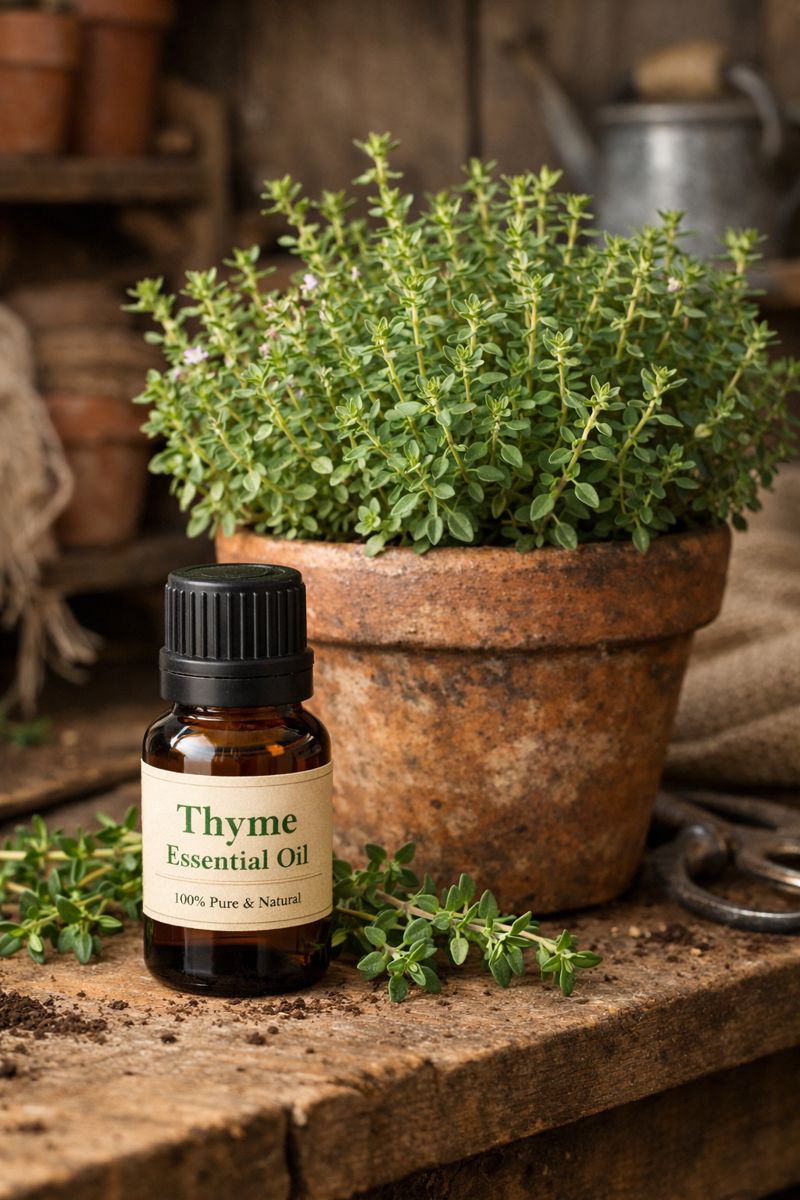
Discover Thyme Essential Oil
A Comprehensive Guide to Origins, Benefits, and Uses
Thyme essential oil has long occupied a respected place in traditional medicine, culinary culture, and everyday household practice across the Mediterranean world. Distilled from the aromatic leaves and flowering tops of the thyme plant, this oil has long been valued for its strong, herbaceous scent and its association with protection, purification, and resilience.
Historically, thyme was far more than a kitchen herb. It was a practical botanical used to preserve food, cleanse living spaces, and support the body during seasonal illness. Ancient Greek and Roman sources describe thyme in fumigations and medicinal preparations, while medieval European traditions continued to rely on it for respiratory and environmental uses. In many of these settings, thyme was employed as part of broader herbal formulas helping to explain its enduring reputation for versatility.
Today, thyme essential oil remains relevant because it aligns with modern interest in plant-based wellness tools that are functional, time-tested, and adaptable. Its appeal lies in its potency and clarity of purpose, grounded in traditional herbal use and increasingly explored through laboratory research into its active constituents.
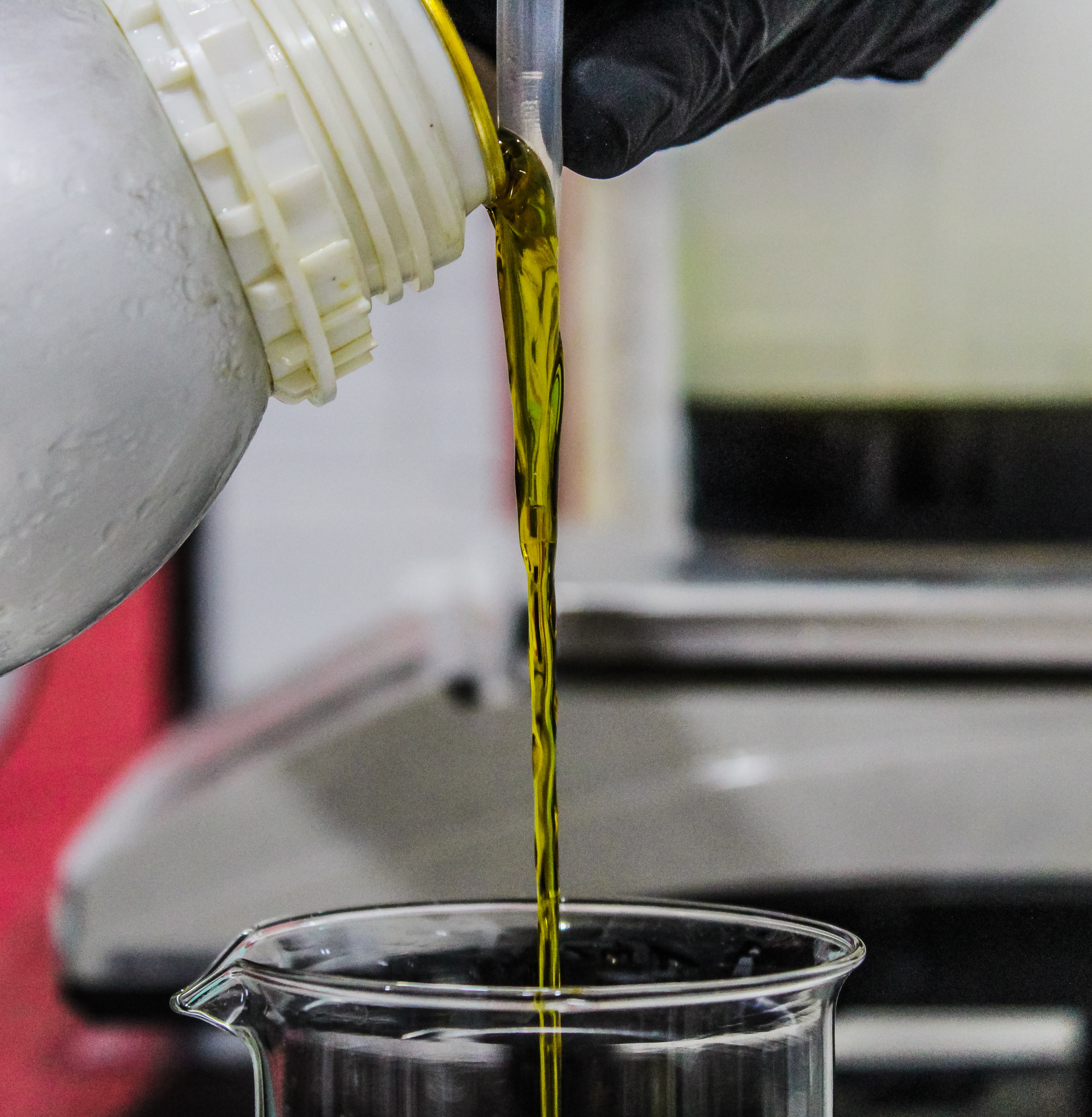
What Is Thyme Essential Oil?
Thyme essential oil is a concentrated aromatic oil obtained from species of the thyme plant, most commonly Thymus vulgaris, a perennial herb belonging to the mint family (Lamiaceae).Botanical Source and Origins
- Botanical name: Thymus vulgaris
- Plant family: Lamiaceae (mint family)
- Native regions: Mediterranean basin, Southern Europe, parts of North Africa
Thyme has been cultivated for thousands of years in dry, sun-exposed environments where its aromatic compounds develop most strongly, particularly in rocky, well-drained soils near coastal climates. Traditional uses included respiratory support, food preservation, wound cleansing, and ceremonial fumigation—applications that often emphasised thyme’s “purifying” character, both physically and symbolically.
In essential oil form, thyme captures the plant’s most concentrated volatile compounds. This makes it far more potent than the dried culinary herb and underscores the need for informed, careful use. Different chemotypes—distinct chemical profiles shaped by genetics and growing conditions—can vary considerably in both intensity and safety, which is why labels may specify types such as thyme ct. thymol or thyme ct. linalool.
How Is Thyme Essential Oil Extracted?
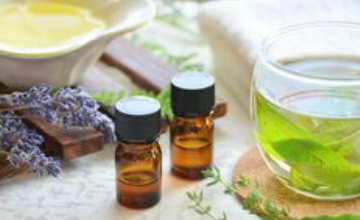
Harvesting the Raw Material
Thyme plants are typically harvested during the flowering stage, when essential oil content is at its peak. The leaves and flowering tops are cut and either distilled fresh or lightly dried before processing, depending on climate and distiller preference.
Key factors influencing oil quality include:
- Climate: Warm, dry growing conditions tend to increase oil concentration
- Soil: Mineral-rich, well-drained soils produce more aromatic plants
- Timing: Harvesting as flowers begin to open helps maximise yield and aromatic complexity
Sustainable harvesting practices—such as avoiding over-cutting and allowing adequate regrowth—are important for protecting soil health and ensuring long-term viability, particularly in regions where wild thyme species also contribute to essential oil production.
Distillation and Extraction Methods
Steam distillation is the most common and preferred method for producing thyme essential oil. In this process, steam passes through the plant material, releasing volatile aromatic compounds. The vapour is then condensed back into liquid form, where the essential oil naturally separates from the water.
This method preserves the integrity of thyme’s key constituents without introducing chemical residues and allows producers to capture distinct chemotypes from different regions.
Solvent extraction is far less common for thyme and is typically reserved for more delicate botanicals. When applied to thyme, it may yield an aromatic extract or absolute rather than a true essential oil, and it is generally less favoured in aromatherapy contexts. The extraction method matters because it directly affects aroma, potency, safety profile, and suitability for topical or internal use under professional guidance.
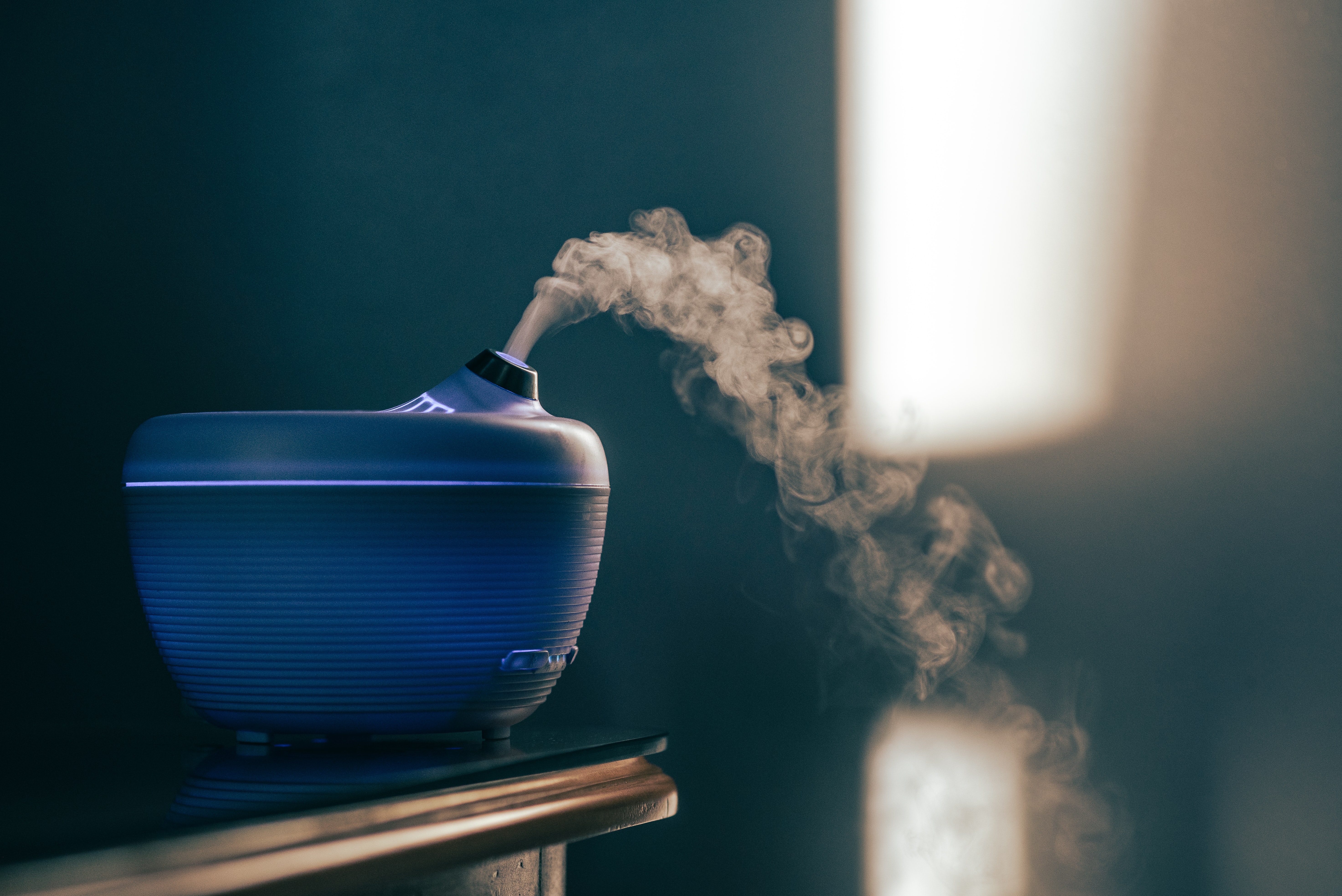
Chemical Composition of Thyme Essential Oil
Thyme essential oil contains a complex blend of naturally occurring compounds that give rise to its distinctive aroma and functional properties. Composition varies depending on species, growing conditions, and chemotype, with some oils dominated by phenols such as thymol, and others by gentler alcohols like linalool.
Key Compounds
- Thymol: A phenolic compound associated with antimicrobial activity and a strong, warming character
- Carvacrol: A related phenol also found in oregano oil, studied for cleansing and preservative properties
- p-Cymene: A monoterpene contributing to aroma and antioxidant activity
- Gamma-terpinene: A monoterpene explored for anti-inflammatory and antioxidant roles in experimental models
- Linalool: A terpene alcohol linked to calming and balancing effects, more prominent in gentler chemotypes
Chemotypes rich in thymol or carvacrol tend to be more aggressive on the skin and mucous membranes, while those dominated by linalool or geraniol are generally milder and more flexible for topical use when properly diluted. Together, these compounds underpin thyme oil’s reputation as one of the more robust and assertive essential oils.
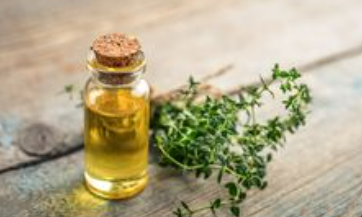
Potential Health and Wellness Benefits
Traditionally Recognised Uses
Historically, thyme preparations were used to:
- Support respiratory comfort, including coughs and congestion
- Clean wounds and maintain skin hygiene
- Preserve food and prevent spoilage
- Purify indoor air through fumigation or smudging
These uses developed through long-term observation and practice, often embedded within broader routines of hygiene, ritual, and seasonal care.
What Modern Research Is Exploring
Contemporary research has examined thyme essential oil and its constituents for properties associated with:
- Microbial balance, including laboratory activity against various bacteria
- Inflammatory response, explored in cell-based models
- Oxidative stress, with several chemotypes showing antioxidant capacity in assays
- Environmental cleansing, including surface and air sanitation applications
A small clinical study has also explored thyme oil in respiratory support alongside standard care, reporting improvements in symptoms, though further research is needed to clarify mechanisms, dosing, and safety. Overall, most available data come from laboratory or animal studies, meaning real-world human outcomes may differ.
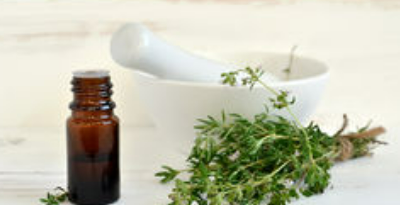
Can Thyme Essential Oil Support Brain and Nervous System Health?
Some components of thyme oil are being explored for their potential roles in managing oxidative stress and inflammation—processes linked to cognitive and nervous system health. Phenolic compounds such as thymol and carvacrol have demonstrated neuroprotective effects in experimental settings, while linalool has been studied for its calming and mood-modulating influence when inhaled.
Aromatic compounds that reach the olfactory system can influence limbic pathways, which may help explain why thyme is often experienced as clarifying or fortifying in aromatherapy blends. This area of research remains preliminary, and different chemotypes may not share identical effects. Professional guidance is recommended, particularly given thyme oil’s potency and the potential for interactions.
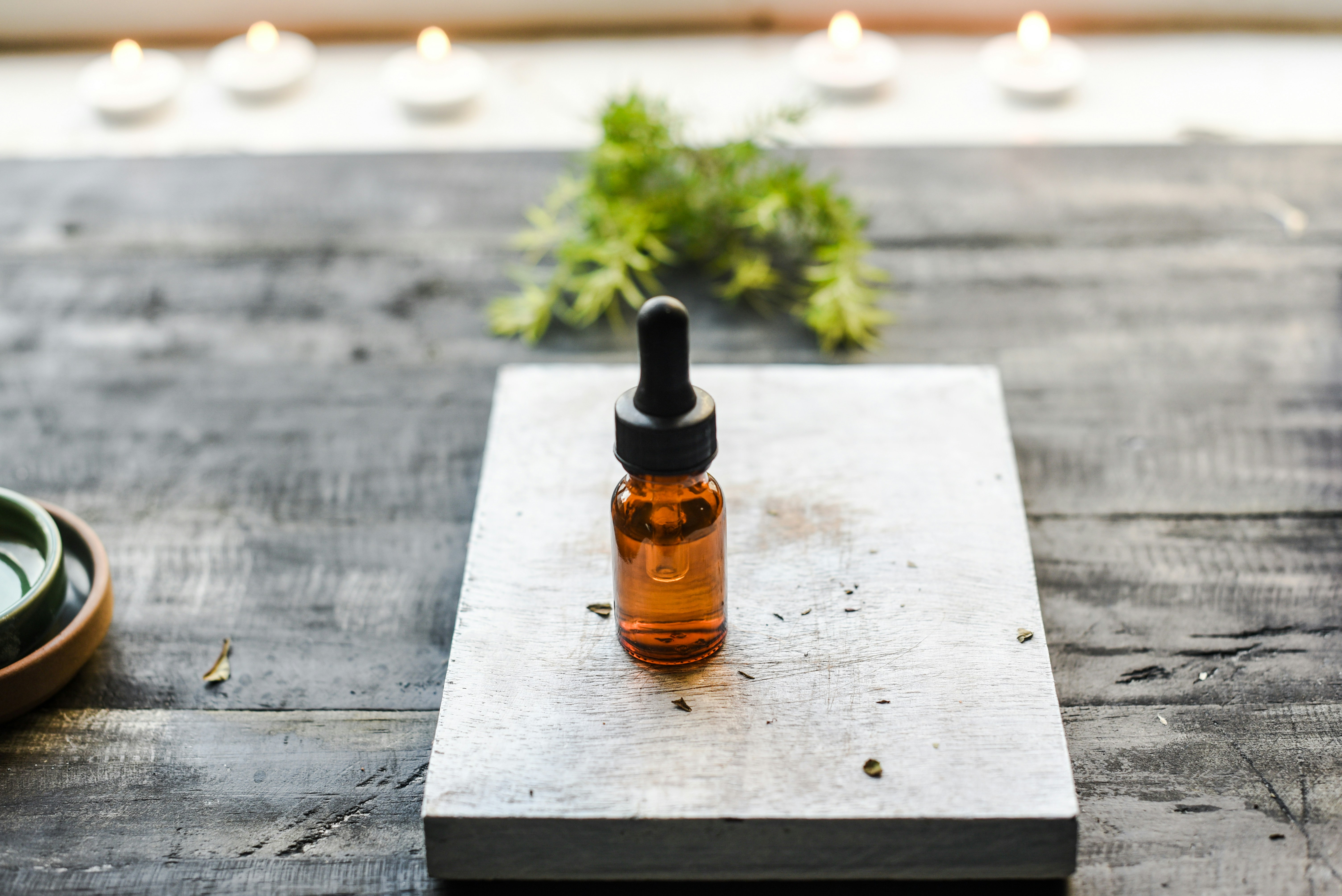
How to Use Thyme Essential Oil Safely
Thyme essential oil is powerful and should always be used with care, especially chemotypes high in thymol or carvacrol.
Aromatherapy:
Diffuse one to two drops, preferably blended with softer oils such as lavender, sweet orange, or cedarwood. Short diffusion sessions in well-ventilated spaces are generally preferred over continuous use.
Topical application:
Always dilute appropriately—often around 0.5–1% for phenol-rich oils and up to 2–3% for gentler chemotypes—depending on sensitivity and professional advice. Avoid sensitive areas and perform a patch test before use.
Bath and massage:
Pre-dilute thoroughly in a carrier oil or suitable dispersant before adding to bath water. Combining thyme with gentler oils helps moderate intensity and improve comfort.
Safety notes:
Thyme oil is not generally recommended during pregnancy or for young children without professional supervision. Ingestion should only occur under expert guidance using food-grade oil. Caution is advised for individuals with bleeding disorders, epilepsy, uncontrolled hypertension, or serious liver conditions.
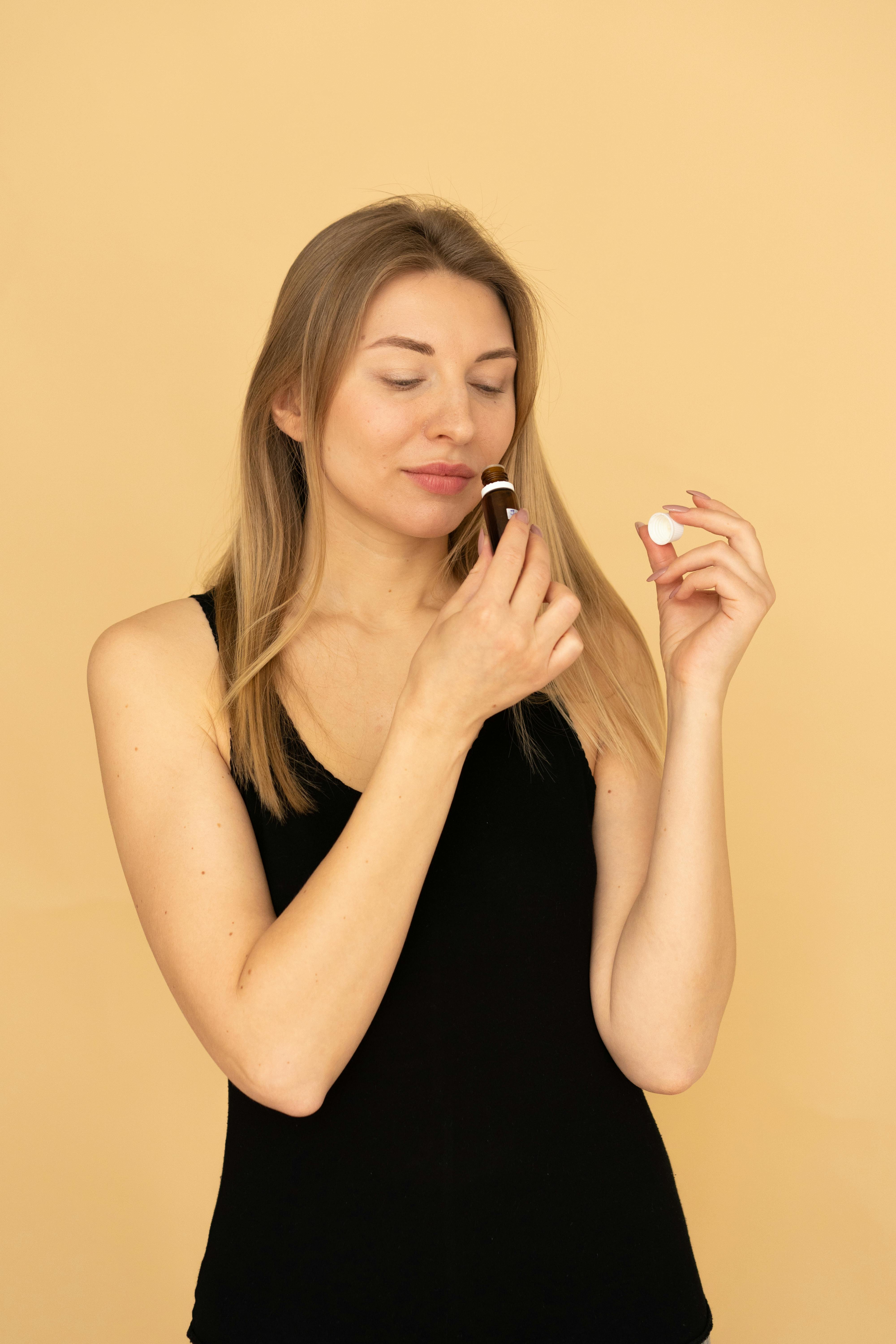
What does Thyme Oil smell like?
The smell of thyme essential oil is strong, herbaceous, and slightly medicinal. It has a spicy, warm, and earthy aroma that is often described as being similar to the scent of thyme leaves. Some people also detect a slightly floral or minty note in the aroma of thyme essential oil. Overall, the scent of thyme essential oil is distinct and can be quite powerful, which is why it is often used in small amounts in aromatherapy blends and natural perfumes.
Essential Oils That Blend Well With Thyme Essential Oil
Thyme essential oil blends well with a variety of other essential oils to create unique and beneficial aromatherapy blends. Some of the essential oils that blend well with thyme oil include:
- Lavender essential oil: has a calming effect and blends well with thyme oil to create a relaxing and soothing aroma.
- Lemon essential oil: has a bright and uplifting scent that blends well with thyme oil to create an invigorating and energizing aroma.
- Eucalyptus essential oil: has a refreshing and cooling scent that blends well with thyme oil to create a respiratory blend that can help to clear the airways.
- Rosemary essential oil: has a strong, herbaceous scent that blends well with thyme oil to create a stimulating and refreshing aroma.
- Bergamot oil: has a sweet and citrusy scent that blends well with thyme oil to create a bright and cheerful aroma.
- Tea Tree essential oil: has a fresh, herbaceous scent that blends well with thyme oil to create a powerful antimicrobial and antifungal blend.
- Geranium essential oil: has a sweet, floral scent that blends well with thyme oil to create a calming and balancing blend.
Overall, thyme essential oil blends well with a wide range of essential oils and can be used to create custom aromatherapy blends to suit specific needs and preferences.
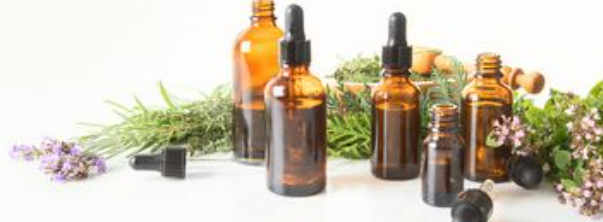
What's special about Thyme Oil and Hair Care
Thyme essential oil has a long history of use in traditional herbal hair and scalp preparations, particularly in regions where thyme was valued for its cleansing and protective qualities.
- Our 🌿 Thyme Oil for Hair Guide 🌿 goes deeper into this topic.
- Explore more about essential oils for hair growth.
Why Is Thyme Essential Oil Known for Strength and Protection?

Across cultures, thyme symbolised courage, purification, and resilience. Ancient soldiers bathed in thyme, homes were fumigated with it, and food was preserved using its aromatic properties. These symbolic meanings align closely with modern observations of thyme’s robust chemical profile and continue to shape how the oil is perceived today.
Closing Notes
In conclusion, thyme essential oil is a powerful and versatile oil that has many health benefits. Its chemical compounds, including thymol, carvacrol, p-cymene, gamma-terpinene, and linalool, contribute to its antimicrobial, anti-inflammatory, and antioxidant properties. Thyme essential oil can be used in a variety of ways to promote health and wellness, but it is important to use it safely and to consult with a healthcare professional before using it for any specific health condition.
If you want tips on natural wellness, you can get them straight to your inbox.

Enter your email below and I’ll share new articles, reflections, and practical insights as they’re published.


